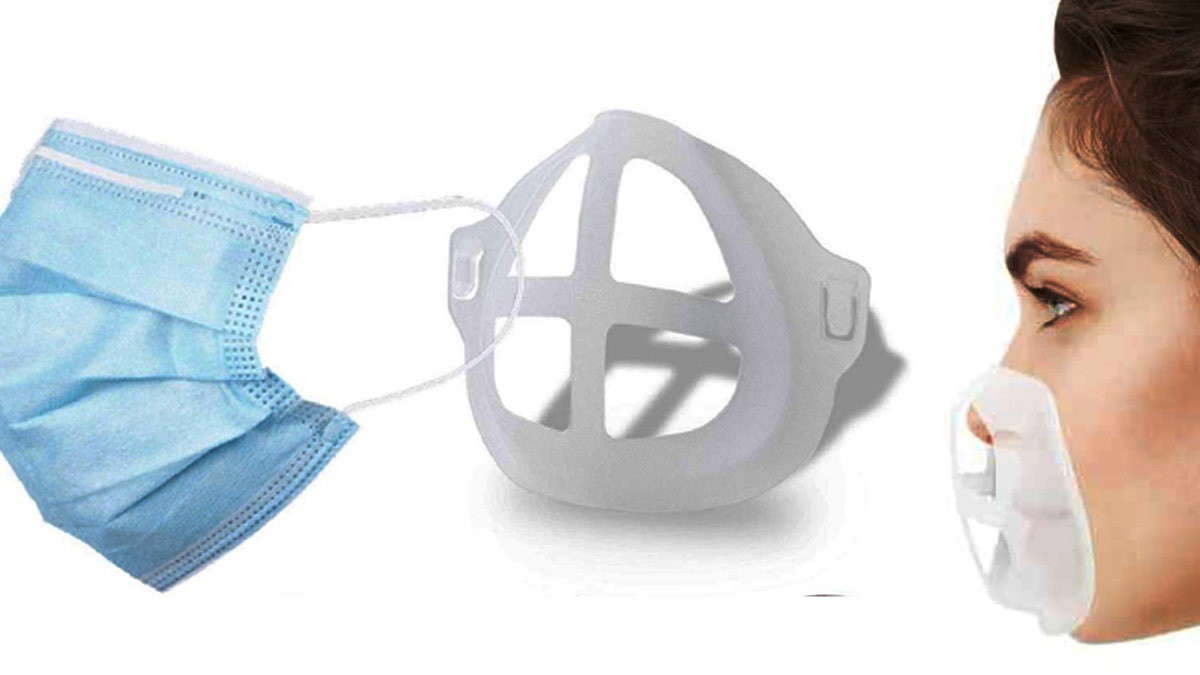Face brackets, the latest coronavirus pandemic trend, has experts questioning how safe they are in protecting against SARS-Cov-2, the virus that causes COVID-19.
The manufacturers of these mask brackets, which are typically made of silicone, claim that they keep the cloth masks from touching your face, ultimately helping to prevent acne caused by masks or so-called “maskne." They also claim the brackets help protect lipstick and makeup, keep the mask from getting stained, and enable easier breathing and comfort, according to multiple advertisements Fox News found while researching the product.
Many of the brackets seem to have a similar design, a pear-like shape with the wider bottom securing around the chin. The cloth face mask can securely attach to the brackets, allowing space between the cloth and the wearer's skin.

A so-called face mask "bracket." (Amazon)
N95 MASKS USED AGAINST CORONAVIRUS CAN BE DECONTAMINATED WITH RICE COOKER: STUDY
“Some people may be more prone to irritation from the masks, such as those with eczema, and may develop a dermatitis when the masks rub on their lips, facial skin or behind their ears. This bracket could help prevent the friction and rubbing of the mask on the facial skin. However, these brackets appear to be made from various types of plastics, which have the potential to cause contact dermatitis. Also, if not fit properly, the hard edges could also be a source of friction and irritation,” Dr. Carrie Kovarik, associate professor of dermatology at the Hospital of the University of Pennsylvania, told Fox News.
Dr. Carolyn Jacob, a dermatologist and affiliate clinical instructor at Northwestern’s Feinberg School of Medicine, told Fox News, “If people are suffering from maskne, they would be best to wear a fitted mask (such as an N95 mask or KN95 mask), which only rests on the skin at the sealed edges. It is also best to avoid extreme heat.” Jacob also recommends discussing skin issues with your dermatologist.
Though there appear to be no reports about the safety of these devices at this time, some infectious disease experts have voiced concerns about the brackets impacting the effectiveness of the mask, which should cover the wearer's nose and mouth and fit snuggly around the sides of the face.
“Because some people have expressed strong opinions that wearing a mask is difficult because it is uncomfortable, all sorts of different ideas are being brought forward to increase mask usage by making them more comfortable. While that is good in theory, any contraption or device that actually weakens the ability of the mask to work is actually not good," infectious disease specialist Dr. Aaron Glatt, an epidemiologist from Mount Sinai Hospital in New York, told Fox News.
HOMEMADE CORONAVIRUS FACE MASKS SHOULD BE TWO OR THREE LAYERS TO STOP SPREAD OF VIRUS, STUDY FINDS
“I am not aware of any studies looking at these bracketed masks, but there [is] certainly the potential that they will allow air to go out and be brought in bypassing the mask because it pushes the mask away from the face," Glatt, also the chair of the department of medicine at Mount Sinai South Nassau, continued. "As with all new products, ideally there should be some evaluation to demonstrate that they accomplish what they claim to be able to do. Till then, I would be wary."
Currently, the Centers for Disease Control and Prevention (CDC) states on its website that masks with two or more layers are most effective when it comes to stopping the spread of coronavirus. Face masks should cover your nose and mouth and fit snuggly against the sides of your face to avoid any gaps, per the CDC, which did not comment at this time on face mask brackets.









































